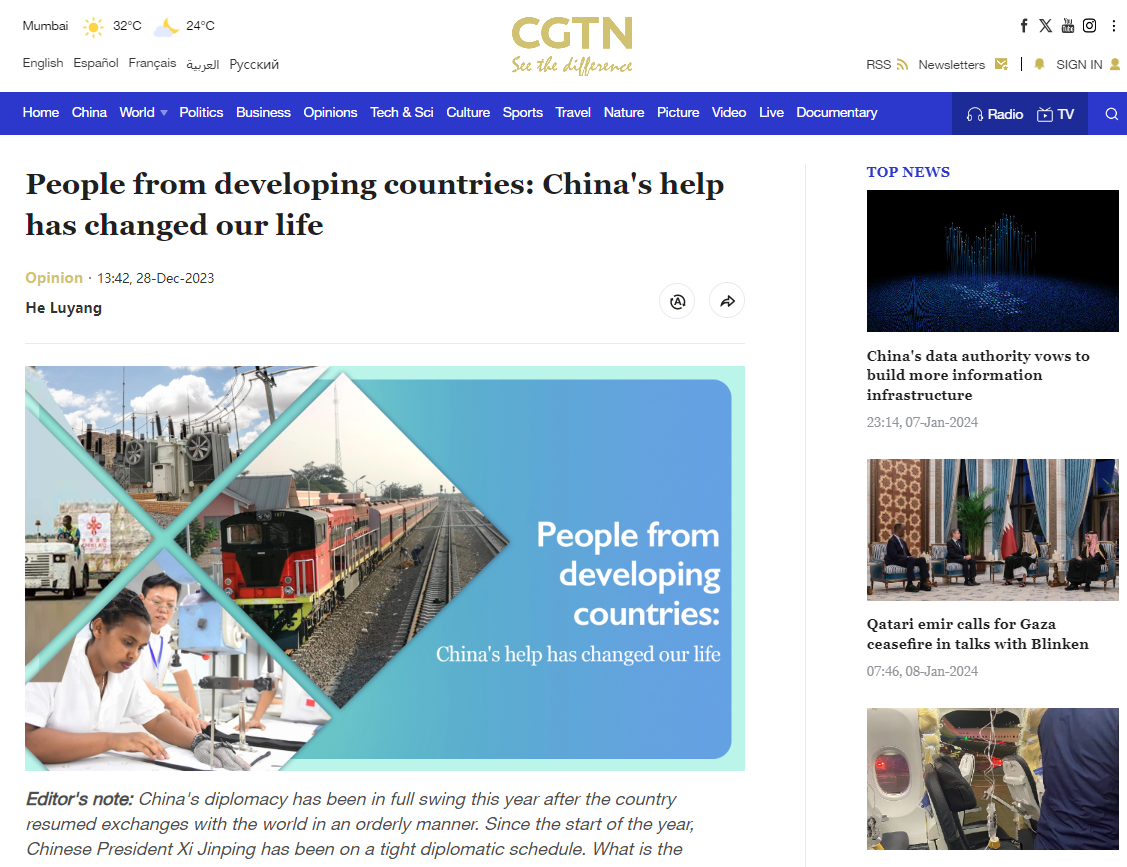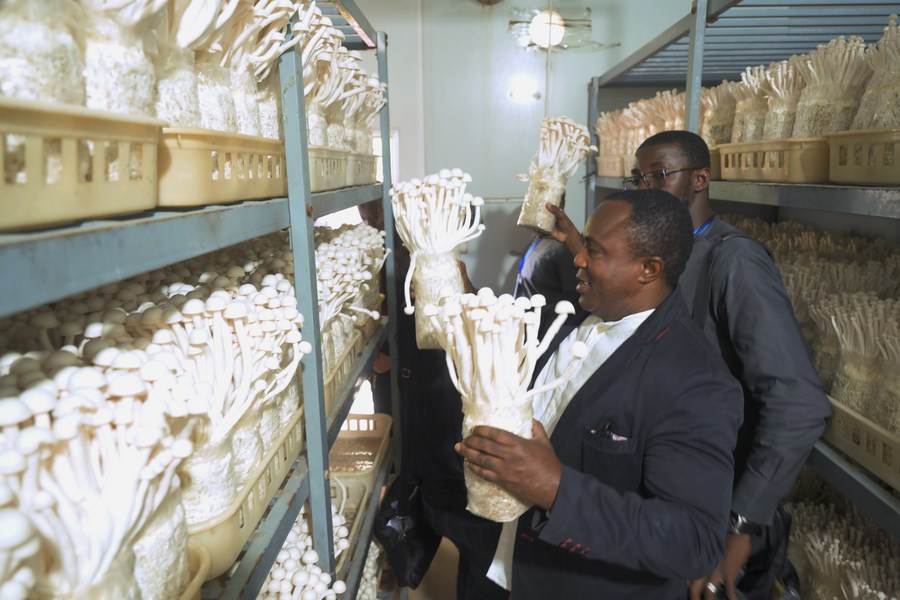LATEST INSIGHTS
Your Present Location: LATEST INSIGHTSJohn Ross: People from developing countries: China's help has changed our life
Source: CGTN Published: 2023-12-28

In Fiji, Juncao is the 'happy grass.' This technology from China enables farmers to grow mushrooms from grasses – instead of trees or woods, thus giving them a stable source of income.
'I have used the money (earned from growing Juncao) to buy a refrigerator, blender, straw mats, etc. I also have built a new toilet and bathroom for our family,' said Seruwaia Kabukabu, an entrepreneur in Serea village of Fiji's Naitasiri Province. After being trained at the Juncao demonstration center, Kabukabu has improved her livelihood from mushroom cultivation and has been encouraging her fellow villagers to follow suit.
'If you give a man a fish, you feed him for a day. If you teach a man to fish, you feed him for a lifetime.' Rather than directly allocating money to the least developed countries, China has been actively sharing Chinese-invented technology, providing tools for the least developed nations to 'fish' on their own.
Fiji is just one of more than 100 countries with which China has shared Juncao technology. So far, China organized a total of 270 Juncao training programs, cultivating over 10,000 people in 18 languages, according to Xinhua reports.

Foreign trainees check mushrooms cultivated on Juncao in Fuzhou, southeast China's Fujian Province, October 14, 2023. /Xinhua
Foreign trainees check mushrooms cultivated on Juncao in Fuzhou, southeast China's Fujian Province, October 14, 2023. /Xinhua
From South Pacific to Latin America to Africa, the technology – by lowering farming costs and reducing annual tree clearing – has helped solve food shortages and meanwhile opened up a new path for developing countries to grow and prosper. 'We earn a lot of money from mushrooms. It has changed our life… I bought cars through mushrooms,' said Korarome Freda, a farmer from Papua New Guinea.
Apart from sharing technologies, China has also been actively directing the global financial system to address financial problems in a more sustainable way – an attempt to create more favorable conditions for developing countries to 'fish.'
For instance, at the BRICS-Africa Outreach and BRICS Plus Dialogue in Johannesburg in August, Chinese President Xi Jinping announced that China had set up a $4 billion Global Development and South-South Cooperation Fund. Through these financial arrangements, China has managed to innovate tailored solutions to build a more inclusive and resilient future for developing countries and bridge the development deficits between the rich and the poor, clearing the barriers for developing countries to 'fish.'

Electronic screens of the 15th BRICS Summit are seen at the O.R. Tambo International Airport in Johannesburg, South Africa, August 16, 2023. /Xinhua
In addition, China has also proposed public goods including the Belt and Road Initiative (BRI), the Global Development Initiative, the Global Security Initiative, and the Global Civilization Initiative to pave the way for these countries' pursuit of self-sufficient development.
In June this year, China signed a memorandum of understanding with Honduras on jointly promoting the BRI. Apart from Honduras, an increasing number of developing countries including Cambodia, Egypt, Kazakhstan, and Pakistan have aligned their respective development agendas with that of the BRI. In October, more than 4,000 world dignitaries gathered in China for the third Belt and Road Forum for International Cooperation.
Under BRI-included initiatives, deals are signed on the basis of consensus and joint efforts of all parties concerned. This ensures voices from the developing world have been fully represented and their internal affairs are not interfered with, thus bolstering developing countries' ability to 'fish' on their own.
'The BRI is the best initiative to make the Global South prosperous and can give a lot of opportunities to developing countries and play a very big role in protecting the environment,' said President of Italy BRICS Institute Vito Rosario Petrocelli. John Ross, a senior fellow of the Chongyang Institute for Financial Studies, Renmin University of China believed that the BRI takes a trend in which the Global South countries are growing faster than those of the Global North.
As the largest developing country, China breathes the same air as the other developing nations. Just as Peter Ndoro, a broadcast journalist in South Africa, said, 'We (developing countries) have common issues, common problems, common hopes and common ambitions,' bringing developing countries' common interests to the fore has turned out to be a key focus of China's diplomacy this year.
China has empowered developing countries by facilitating technology transfer, enhancing financial governance, and putting forth development-oriented initiatives. This support, as Eduardo Regalado, a senior researcher at the International Policy Research Center of Cuba, noted, enables these nations to articulate their needs, advance shared economic interests, and strengthen their collaborative negotiating capabilities.























































































 京公网安备 11010802037854号
京公网安备 11010802037854号





